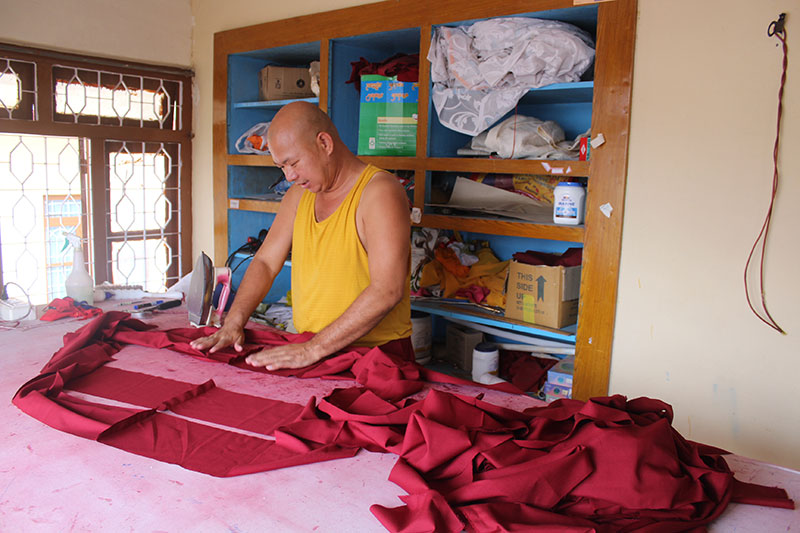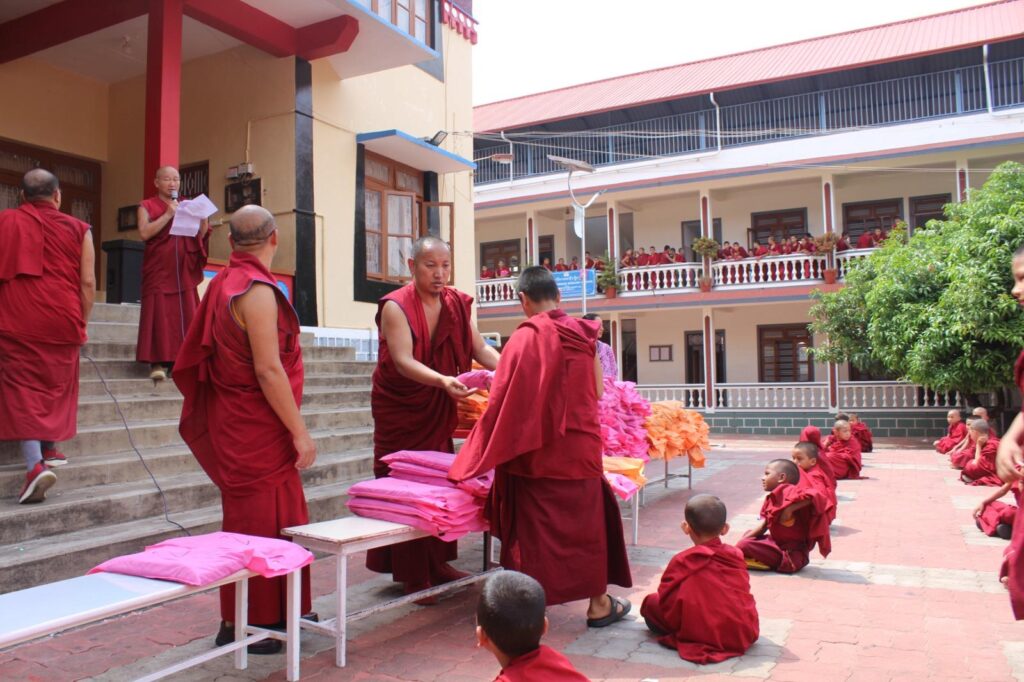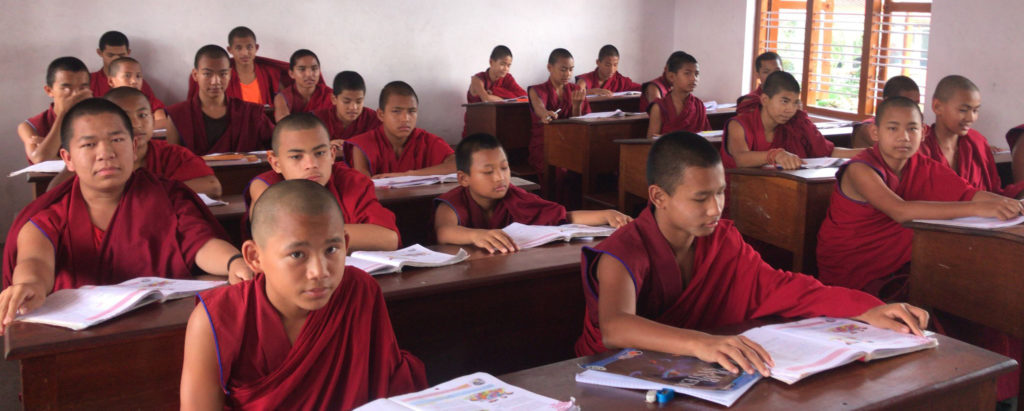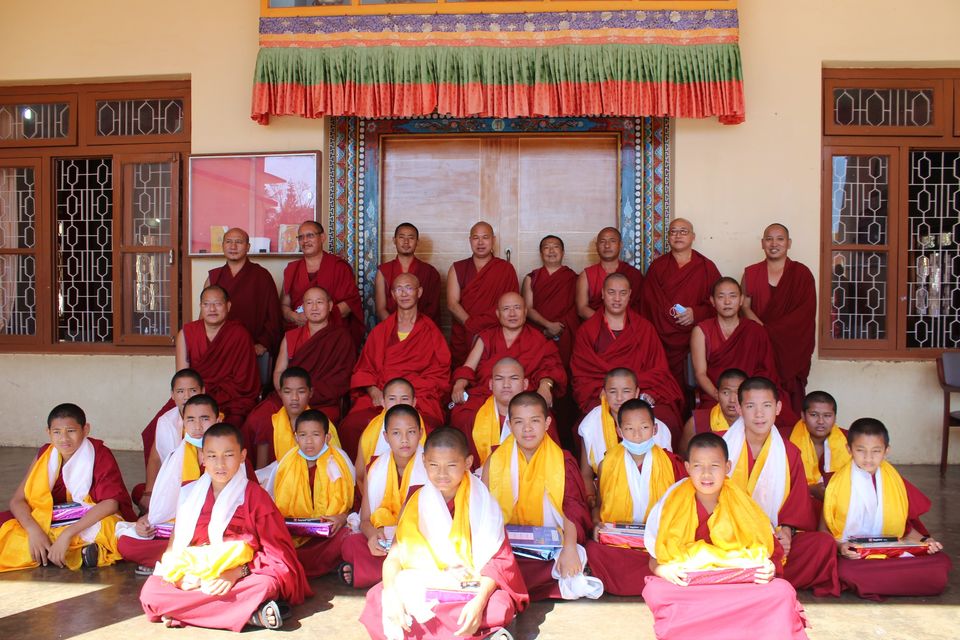Project “Maintaining studies in a monastic environment for vulnerable children in post-Covid economic hardship”
This project was approved by 8×1000 Italian Buddhist Union in October 2022.
BACKGROUND
In 1959, the exodus to India began for thousands of Tibetans: the Indian government made extensive land, divided into 39 settlements, available to the first refugees. The state of Karnataka in South India is home to the largest communities.
Here the Tibetans have tried to preserve their ancient and precious culture, even re-founding the main monastic institutions, the heart of their communities.
The settlement of Bylakuppe in Karnataka, opened in 1960 with about 3,000 inhabitants, is now home to about 11,000 people. It is a rural area and the monasteries are surrounded by small villages. Most families live by subsistence farming, and the villages often lack essential infrastructures.
Serpom Monastery in Bylakuppe originates from the great Sera Monastery in Tibet, founded in 1419. Re-established in India in 1970, it is registered as a non-profit organisation and Monastic University. Today it is home to 550 monks, among whom 205 children and young people coming from the surrounding villages, but also arriving from the poorer areas of the Indian and Nepalese Himalayas, and from Sikkim. Many have been admitted having lost one or both parents, others arrive at the Monastery requesting help because their families are unable to take care of them. Requests for help often come through older monks originating from the villages themselves. Most of the newcomers have never had the chance to attend school.
Over the past two years, the severe economic difficulties related to the pandemic have led to a huge increase in new applications from exhausted families who are, at least temporarily, unable to care for their children. Many families, surviving by begging or the income from temporary jobs, have been driven to desperation by the pandemic.
During the last 2 years the Monastery has tried not to close its doors to anyone, welcoming 78 new young guests whose families were no longer able to provide for their needs.
Monasteries survive thanks only to donations and often find themselves in a state of emergency with few means available. Particularly in this period the economic difficulties in the international scenario — caused by the pandemic — are also affecting the Monastery’s income. On one hand the Monastery is experiencing increasing uncertainty and on the other hand is dealing with an increasing number of requests and the continuous arrival of new children.
THE MONASTERY SCHOOL
The Monastery offers children accommodation, food, clothing, medical care, and guarantees the young guests’ right to an education.
The children are divided into small ‘family groups’ according to their age and origin and senior adult monks are assigned to take care of each group.
Understanding the great responsibility towards the children under its care, the Monastery ensures that in addition to monastic education the children also receive ordinary schooling, which will give them a better chance for the future whether they decide to remain in the monastery or not.
For this reason, Serpom Monastery registered with the Karnataka State authorities an in-house school — the Serpom Education Society. Presently, the School has 205 students between the ages of 6 and 16.
It has 8 external teachers for the curricular subjects (English, Tibetan, mathematics, science and social studies) as well as 5 monastic teachers who guide and supervise the sessions of memorisation, prayer recitation, traditional Buddhist art and the preparation of ritual materials. The School is open 6 days a week, has 8 classrooms and currently runs classes from kindergarten to class 5.
The headmaster and teachers of the Serpom Education Society have requested help to overcome the difficulties of buying the materials they need on a daily basis such as stationery and up-to-date textbooks for study. The project includes the purchase of 2870 books (7 books per year per student), 5740 exercise books (7 exercise books per term), 410 sets of pens, pencils and sharpeners, corresponding to the estimated needs for 2 years for the 205 students.
The school also provides lunch for the young monks and their clothing.
Feeding the children is also a big challenge, and the school would like to be able to offer them a daily nutritious diet of fresh food appropriate to their age and the very hot climate. Every day the Monastery kitchen prepares large quantities of rice, chapati (thin bread), lentils and vegetables.
To guarantee the young guests all the necessary nutrients, as requested by the Monastery, the project will also provide them with a portion of fresh fruit and milk every day. These are rather expensive foodstuffs which means currently the children only receive a portion of fruit twice a month.
At the moment, the children only have one set of clothing, which they generally reuse still damp after washing, and as footwear they only have rubber flip-flops. For each child the project will provide a second set of clothes and a pair of good shoes.
NON-FORMAL EDUCATION WITHIN THE MONASTERY
Buddhist education, offered to the young students, rests in its essence on the universal values of peace and non-violence, respect for all forms of life — human and non-human — as well as of the environment and its elements, on the sense of self-responsibility and the interconnection of the individual with the whole.
Community life within the Monastery helps the children to develop their social and relational skills and their sense of belonging, in a context of rules always based on mutual respect and help.
Respect for things and environmental sustainability is also manifested in the continuous focus on recycling — for example of books and school materials — and in the constant teaching of waste-free management of the precious resources obtained, in a context based on living with minimal and essential consumption.
Planned start date of the project: 15/10/2022
Updates September-November 2023
Updates December 2023 – April 2024

May 2024: the distribution of new clothes sewn in the Monastery’s tailoring shop to the little monks




